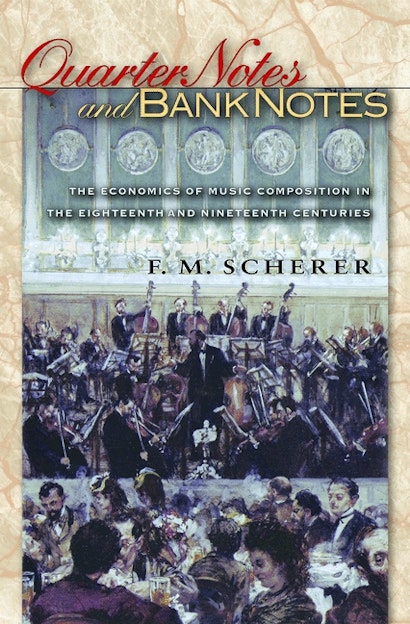In 1700, most composers were employees of noble courts or the church. But by the nineteenth century, Chopin, Schumann, Brahms, Verdi, and many others functioned as freelance artists teaching, performing, and selling their compositions in the private marketplace. While some believe that Mozart’s career marks a clean break between these two periods, this book tells the story of a more complex and interesting transition.
F. M. Scherer first examines the political, intellectual, and economic roots of the shift from patronage to a freelance market. He describes the eighteenth-century cultural “arms race” among noble courts, the spread of private concert halls and opera houses, the increasing attendance of middle-class music lovers, and the founding of conservatories. He analyzes changing trends in how composers acquired their skills and earned their living, examining such impacts as demographic developments and new modes of transportation. The book offers insight into the diversity of composers’ economic aspirations, the strategies through which they pursued success, the burgeoning music publishing industry, and the emergence of copyright protection. Scherer concludes by drawing some parallels to the economic state of music composition in our own times.
Written by a leading economist with an unusually broad knowledge of music, this fascinating account is directed toward individuals intrigued by the world of classical composers as well as those interested in economic history or the role of money in art.
F. M. Scherer is Aetna Professor Emeritus at Harvard University's Kennedy School of Government, Lecturer at the Woodrow Wilson School, Princeton University, and the author of many books.
"Scherer has broken new ground with his exciting interdisciplinary approach and use of massive quantitative and qualitative data—the scale of this achievement cannot be overstated."—Siobhan McAndrew, Business History
"This new book by F.M. Scherer explores aspects of the music business in Western Europe during the eighteenth and early nineteenth centuries, and asks the question of how classical composers there made the transition from feudal to capitalist society. . . . Scherer brings a much-needed sense of maturity and respectability to the study of music and commerce. . . . Scherer's work on the economics of music publishing is especially informative. . . . Anyone interested in the rise of market practices in Europe will enjoy [this book], especially if they like casual music."—James P. Kraft, Enterprise & Society
"In a bold interdisciplinary foray, Dr. Scherer has used his highly regarded economist's skills to explore how leading European composers managed to support themselves during the 18th and 19th centuries. The result is an absorbing study of how creative artists adapted to the vast economic and social changes that occurred around them during the greatest era of musical composition."—Derek Bok, Harvard University
"This book is a courageous and entirely user-friendly foray into a novel cross-disciplinary arena between music and economic history. It is a provocative and highly informative account of the economic realities and constraints surrounding the history of musical composition. It is part social history, part economic history, and above all a case study in the economics of an enterprise that once flourished and is now endangered. Scherer makes with care and clarity the case for the paradigm of patronage. This book is a gem. It mixes elegant prose with the hardheaded, yet speculative analysis of economic and social data. This should be required reading for all students of music history."—Dr. Leon Botstein, President of Bard College, Music Director of the American Symphony Orchestra and the Jerusalem Symphony Orchestra
"An excellent piece of work. I know of no other study of the economics of musical composition that has dealt with so large a sample of composers and has systematically analyzed their economic circumstances, their relation to the marketplace and with noble employers, their associations with music publishers, and a host of other fascinating subjects."—William J. Baumol, author of The Free-Market Innovation Machine
"There is no economist around—on either side of the Atlantic, never mind the Pacific—who can speak with more scholarly depth and authority on the subject of musical economics. This book addresses a broad audience with clarity and impressive insight—a most welcome and highly informative reading for the cultured music lover."—Christoph Wolff, Harvard University

